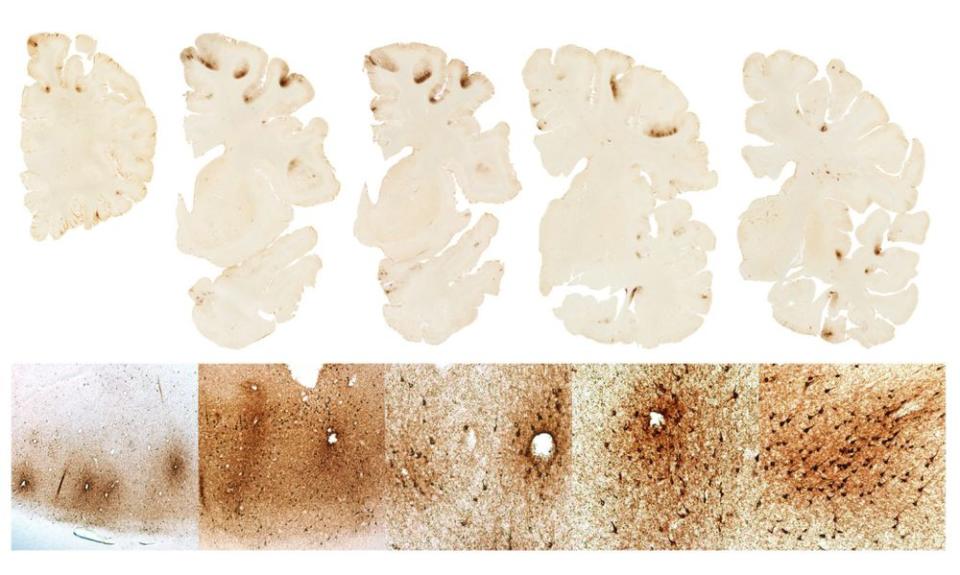The Truth About Aaron Hernandez: Brother Opens Up About His Paranoia, Abuse and Sexuality Rumors

By all accounts, Aaron Hernandez’s life ended in suffering and disgrace.
Once a rising star in the NFL, his violent streak lost him everything as he became entangled in multiple criminal cases. In 2017, he hanged himself with a bed sheet in prison. He was 27.
Hernandez died by suicide just five days after he was acquitted of double murder charges in the deaths of two men outside a Boston nightclub in 2012. Found not guilty in one case, he was already serving a life sentence for masterminding the 2013 murder of Odin Lloyd, his fiancée’s sister’s boyfriend. He was not eligible for parole.
Hernandez’s rapid rise and equally rapid fall thrust his background and upbringing into the spotlight, as the facade of a champion gave way to darker truths. (The Boston Globe dove deeply into the subject in a recent six-part investigation.)
A new book by his older brother shows such tragedy traced back years in Hernandez’s life, long before he began playing for the New England Patriots and was ever implicated in a homicide.

Jonathan Hernandez recently released The Truth About Aaron: My Journey to Understand My Brother — and he tells PEOPLE that Aaron suffered physical, emotional and sexual abuse before devolving into a life of violence.
“I wanted to tell his story so that people could understand who my brother was,” Jonathan says. “He had a lot of things happen, both good and bad. People think they know about my brother, but they really don’t. They know what they saw in the news, but they don’t know all the struggles he faced.”
As an adult, Aaron disclosed that he had been sexually molested when he was young. In his book, Jonathan describes a game of hide-and-seek that they played with two older boys. Jonathan was 9; Aaron was 6.
Jonathan recalls that his brother was forced to hide in a tent with an older boy who molested him. “Aaron didn’t say a word,” he writes. “I had no idea what he had just been through.”
Jonathan also alleges that their father, who died in 2006, was physically abusive.
“Our father would hit us for anything from a bad grade to disrespectful behavior to sheer clumsiness,” he writes in his book.
When Jonathan threatened to call child welfare officials, his father challenged him, he says: “He handed me the phone before saying, ‘Call them. As soon as you hang up the phone, I will beat you boys harder than you’ve ever been beat before. They will have to pull me off of you after they break down the door.’ “
• Want to keep up with the latest crime coverage? Click here to get breaking crime news, ongoing trial coverage and details of intriguing unsolved cases in the True Crime Newsletter


Aaron’s attorneys have said that he suffered severe chronic traumatic encephalopathy (CTE), a degenerative brain disease that has been linked to head trauma and has been diagnosed in multiple NFL players.
“Aaron experienced a chaotic and horrendous existence in many respects, due to his undiagnosed brain injury,” his attorneys alleged in a lawsuit against the NFL. In another part of the suit, which is still pending, his estate said that CTE causes “aggression, explosive behavior, loss of concentration, mood swings, depression, apathy, and cognitive impairment.”
An NFL spokesman said last year the league “intend[ed] to contest the claims vigorously,” according to USA Today.
In his book, Jonathan recalls several times that his brother was hit in the head. Jonathan also addresses rumors that Aaron was gay or bisexual, which emerged after his death, fueling speculation that among other demons Aaron was fearfully — even aggressively — closeted. (He is survived by his longtime fiancée, with whom he had a daughter.)
RELATED: Aaron Hernandez’s Prison Suicide Notes Released — ‘Love, Repent … I’ll See You All in Heaven’
In his book, Jonathan remembers an incident at his bachelor party when he allegedly walked in on his brother in bed with two male friends. Later, he says, he questioned Aaron about it.
“I asked Aaron if he was gay,” he writes. “‘If you are, I don’t care,’ I said. ‘I love you. You are my brother.’ “
But Aaron reacted angrily, according to Jonathan.
“Don’t you ever ask me that again,” he says that his brother replied. “If you say that again, I’ll f—ing kill you.'”
A man claiming to be Aaron’s jailhouse lover went public following his suicide, and his former teammates at the University of Florida told PEOPLE about his relationship with another football player. A high school teammate also detailed an alleged sexual relationship he had with Aaron.

In the last years of his life, Aaron displayed behavior consistent with paranoia, Jonathan writes. He stockpiled weapons and even slept with a butcher knife next to the bed.
“People are after me,” Johnathan says Aaron explained. “I’ve got it for protection.”
Jonathan writes that he asked Aaron who was after him. “Everyone,” he responded, according to Jonathan. “The FBI. Everyone.”
The Truth About Aaron, Jonathan says, is an attempt to provide a more complete — more human — portrait of someone ultimately undone by their flaws. Jonathan says he misses his younger brother “every day” and does not describe him as a monster.
After his suicide, a lawyer for the mother of Aaron’s victim said her reaction to his death was “mixed,” but that she believed “this is God’s will.” At his sentencing, she said, “I forgive the hands of the people who had a hand in my son’s murder.”
“He was a guy with problems,” Jonathan says of Aaron.
“I hope people can take away that you don’t always know someone from the news stories,” he continues. “He was a complex man.”

